I've worked for manufacturers and they indeed do extensive testing but there is no way a few people can possibly think of every possible way that a customer may handle or use any product. Not everyone uses any product in the same way as the next guy. Once a product hits the market there are always issues that pop up unexpectedly and must be corrected. Also once mass production begins people on the line do make mistakes and cause failures. I can assure you there has never been any product ever produced that hasn't had all of these issues occur. The key is how well the manufacturer handles the problem.
"You've worked for manufacturers"
"I am a manufacturer"
And I take exception to how you have portrayed them.
And, to how you have lumped all of us together.
I'm in my 44th year of the trade. Not counting 6 years of school prior.
Did my apprenticeship in a European shop.
"From the very start the focus was on "Quality", production sure, but quality first.
Hung out my own shingle in 1984.
Some manufacturers have a focus on quality, others focus first on profit.
I've worked for manufacturers and they indeed do extensive testing
There is no way on earth you can speak for each and every manufacturer.
In this case it's painfully obvious that the factory, "Isn't testing the units before shipping"
And that testing should be done at 15 FT.
"That's the blanket engineering allowance for 10 ft certification".
The same reason that firearms are tested with a "Proof Load".
Passing that, the unit is good to go.
If the factory was testing these units before shipping, no end users would receive a bad unit.
Those units would never leave the factory. Only units that passed the test would ship out.
It appears that they are skipping a step, a crucial step, when it comes to "Quality Assurance".
When you quote a specification for unit you'e brought to market, you have to test it to
assure the end user that it will perform as advertised.
These units should come with a sticker or stamp showing that they have been tested, and
are certified to be watertight to a depth as stated.
In my industry the unit would come with a, "Certificate Of Conformance".
The standard in some industries is 1% defects.
One percent or less of course.
That can't be done reliably without a decent quality system in place.
Some pictures of my work,........
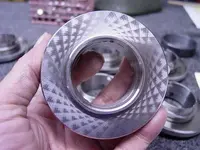
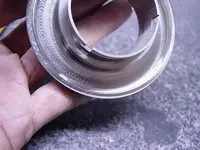
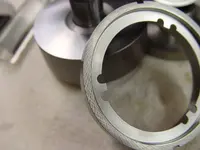
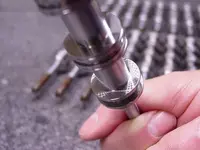
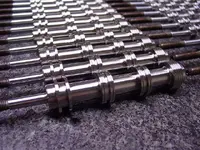
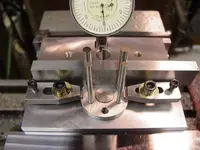
How many mistakes do you think I'm allowed?
And before you all say, "sure with today's CNC machines,.......
The newest machine in my shop was made in 1962.
That work, and all the work I push out, is "all done on worn out manual machines"
What you see there is skill and experience.
"And a lot of inspection, checking, and double checking"
If I can manage to check out every job I ship out, and I'm just a small one man shop,.......
And they are a multi million dollar company with plenty of employees, and the wherewithal
to institute a good quality system,........
"That's not a good indication"
It appears they are taking a short cut, and it came around and bit them on the backside.
What have you heard in the past?
"Do it right the first time"
"A job worth doing is worth doing well"
"Do you want it right?, or do you want it right away?"
"Haste makes waste"
These sayings came about because of "Life's Lessons"
End users in this case should ask that the unit they will receive has been tested,
to assure it's watertight to the depth the manual states.
Honestly, all of these units should be tested before they ship.
When they get failures down to about 1% or so, they have the problem on the run.



 ?? Because it already failed the first time !!! I dont want an ongoing weekly relationship with minelab, I dont want to spend my time filling out warranty apps., I dont want to have to burp my machine all the time, and what good is it to have to dry out my headphone socket everytime it gets splashed..... that is all time away from the hunt.....BS !! Oh....I see I'm supposed to believe that out of the thousands of EQs out there that it's just a tiny portion of those that have failed....you know why ??...because the vast majority never see the water !! What's the failure rate among dedicated water hunters ?? How many of these machines have actually seen a 5ft depth for longer than a couple hours ?? Keep in mind 5ft. Is half its rating and I would wager that only a small percentage of water hunters have actually submerged it for any length of time at that half rating depth. Most hunters wade from knee deep to chest deep water and that control unit never gets submerged beyond 3-4 feet. And that's what mine lab was counting on. Any one who is gonna stay at 4 -6 ft depth with the head unit down there should be wary of flooding. I often keep a tank in my kyak with a 30 ft hose so I can stay at depth and dig effectively.....sand scoops are often useless here in the keys with light sand over coral rock, so its dive down and hand fan. It's obvious to me that many have not been electrocuted with faulty or the wrong headphones......well guess what you may laugh because you think it cant happen well it does happen from time to time as equipment starts to fail. If you've ever been stung on the face by a moon jelly or man o war....well that's what it feels like. Your brain and face become the grounding spot for the stray current. Lit me up good on 2 separate occasions!! So mine failed at 6-8 ft with a pair of underwater headphones after 20-25 mins. It had been in the water wading many times and also worked pretty good submerged at 2-4 ft for 30 mins at a time. There is no doubt about the capabilities of this machine....its a beast as far as its detecting capabilities !! And I'm not worried about the warranty....mine lab is great in that respect (although slow at times). I paid this machine off quickly with finds and was able to throw a banner up top with it in just 3-4 months of ownership !! I love its capabilities. I just wont be taking it in the water past waist to chest deep. When it's time to submerge the unit in real world conditions in water deeper than 3-4 feet for any longer than 10-15 mins....I'll use the excal !! Being realistic....this is a water resistant machine at best in my opinion !!
?? Because it already failed the first time !!! I dont want an ongoing weekly relationship with minelab, I dont want to spend my time filling out warranty apps., I dont want to have to burp my machine all the time, and what good is it to have to dry out my headphone socket everytime it gets splashed..... that is all time away from the hunt.....BS !! Oh....I see I'm supposed to believe that out of the thousands of EQs out there that it's just a tiny portion of those that have failed....you know why ??...because the vast majority never see the water !! What's the failure rate among dedicated water hunters ?? How many of these machines have actually seen a 5ft depth for longer than a couple hours ?? Keep in mind 5ft. Is half its rating and I would wager that only a small percentage of water hunters have actually submerged it for any length of time at that half rating depth. Most hunters wade from knee deep to chest deep water and that control unit never gets submerged beyond 3-4 feet. And that's what mine lab was counting on. Any one who is gonna stay at 4 -6 ft depth with the head unit down there should be wary of flooding. I often keep a tank in my kyak with a 30 ft hose so I can stay at depth and dig effectively.....sand scoops are often useless here in the keys with light sand over coral rock, so its dive down and hand fan. It's obvious to me that many have not been electrocuted with faulty or the wrong headphones......well guess what you may laugh because you think it cant happen well it does happen from time to time as equipment starts to fail. If you've ever been stung on the face by a moon jelly or man o war....well that's what it feels like. Your brain and face become the grounding spot for the stray current. Lit me up good on 2 separate occasions!! So mine failed at 6-8 ft with a pair of underwater headphones after 20-25 mins. It had been in the water wading many times and also worked pretty good submerged at 2-4 ft for 30 mins at a time. There is no doubt about the capabilities of this machine....its a beast as far as its detecting capabilities !! And I'm not worried about the warranty....mine lab is great in that respect (although slow at times). I paid this machine off quickly with finds and was able to throw a banner up top with it in just 3-4 months of ownership !! I love its capabilities. I just wont be taking it in the water past waist to chest deep. When it's time to submerge the unit in real world conditions in water deeper than 3-4 feet for any longer than 10-15 mins....I'll use the excal !! Being realistic....this is a water resistant machine at best in my opinion !! 






